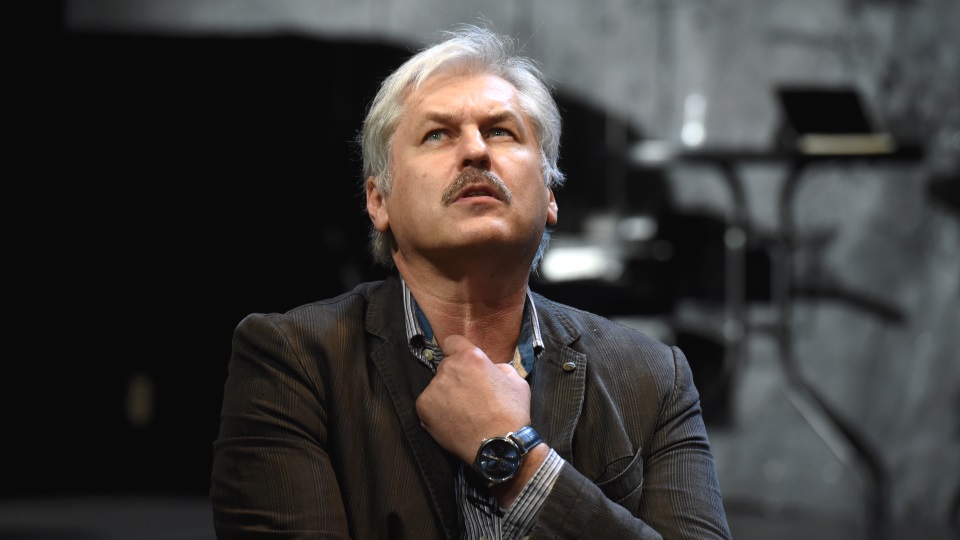The concert recording, which will be broadcast on the TV channel ReTV and so on July 10 at 22.00 Homepage, songs composed by Jānis Poruks, Ojārs Vācietis, Māris Čaklā and Broņislava Martuževa will be played. Poets in different stages of Kalniņš’s work have served as an artistic impulse, an internal order to become the composer’s own music. The pursuit of beauty, love, rebellion, philosophical vertical, poetic longings connect the world of poetry with roller coaster garu. The concert will feature texts spoken by Imants Kalniņš himself about these poets.
“I think song is the most complete form of music. Music is basically made for singing,”
Imants Kalnins said in the book “New Music”. We will hear such compositions as Kalniņš’s choir songs from the cycle “Ten Songs with the Words of Jānis Poruks”, the rock ballad “Seven Sad Stars”, from which the melodies later grew the Fourth Symphony, “I Came in Silence”, “Where the Star Is”, “Marija, Aglonas mother “and others.
Inta Pīrāga: On your joint journey with the Latvian Radio Choir, you have repeatedly stopped and laughed at a well filled by Imants Kalniņš. One of your first joint projects back in the 1990s was a cycle with a text by Jānis Poruks. Among the latest performances, many remember your wonderful productions “Imants and Ziedonis”, “Poet and Mermaid” and, of course, a concert performance with the words of Bronislaw Martuževa. Tell me, is there still something you are able to wonder about when you open the notes of Kalniņš?
Sigvards Kļava: What I don’t stop to wonder about is the wonderful thing that Imants Kalniņš’s music does not give in to a rational explanation. I cannot say what it is that is beyond any predicted success or failure.
Why are there compositions that live in people’s memories outside of a certain event?
I could call many, many songs here, which live their lives, even Imants Kalniņš himself is unable to explain why this is so.
Although Imants himself says clearly and unequivocally – if any songs do not live in people’s memories, then they need it. That they deserve to not be able to speak.
Hence the answer to their wonder – that music has drawn through and through from a very powerful source; mostly it is excellent poetry. Perhaps the answer is that we feed on one source – poetry, which is extremely important to Imants Kalniņš. He is also not ashamed to read it by heart and is not ashamed to talk about it, but is that an explanation for what is to be wondered about? I don’t know that.
But what is definitely surprising is that the inner feeling requires returning to this music at very different times, and how nice it is that this great state of war or state of change came with the moment of Imants’ birthday,
when we were able to return to the mess of all great change and change and try to congratulate Imants on his birthday. And to look at his music, on his personality from different angles.
You have almost answered my next question, have you become more pragmatic about Imants Kalniņš over the years, but you have already answered – that, however, absolutely not that this emotional is still in good balance.
Definitely! [Labprāt] I would study or re-study Kalniņš’s very well-known opuses, because I see more freedom, more inspiration.
Imanta’s music now gives me more power to hover without getting old – which is very important.
That is probably the answer to their wonder. Maybe we physically change – with other features, different hair color, but that spirit … Back then it was a hippie spirit, today it is a spirit of freedom, unrefined relationships and maybe specially designed musical things against the law – they are interesting through and through. But I have no rational explanation for why there is a huge attraction to this music, to this personality. As next to everyone meinstrīmiem there are things that are just really needed from time to time.
What you say – that Kalnins does not allow you to grow old – is also a lot. Both you and I belong to a generation that grew up with “Sand Cake,” “Prince and the Beggar Boy,” and “The Song You Started With.” And yet – committing to create Kalniņš’s anniversary program in today’s context, it is clear that everything that has stratified over the years cannot be accommodated there. As the author of the concert idea and the artistic director, you had to peel the bulb off and choose the path you want to take with this concert performance …
Every stage of my creative life is connected with a creative friend, an object of creative worship. And this moment is related to Imants Kalniņš – I think about his music, personality, his contribution, and this is an incomparable moment in my creative life. This is exactly how I wanted to show different Imants Kalniņš, not only in terms of time –
I wanted to show how extremely well Imants fits into the creative friendship of “composer and poet”.
So there will be five different relationship stories. This is how I wanted to show Imants’ music – as Imants and the poet. How Imants Kalnins conveyed the idea to Imants Ziedonis of how beautiful a tandem is a poet and a mermaid, which was then so beautifully realized in the collaboration of both. But the same stories this time will be Imants and Jānis Poruks, Imants and Broņislava Martuževa, Imants and Ojārs Vācietis, Imants and Māris Čaklais, Imants and Ziedonis. Each of these creative friendships comes with its own power, its own inner explosive, a very specific sheet music pattern. Of course, we can’t lose the “roller coaster” sound, his musical handwriting, at any moment. Therefore, when creating this concert performance, I wanted Imants himself to talk about these poets – not so much to talk about music or eras, but for Imants himself to discover what his relationship with one or another poet means in his life. How is it influenced or what is their creative and also human friendship. I found this conversation very interesting myself! I am glad that Imants devoted himself to this game – about how we are influenced by the creative spirit, word, idea.
You were one of those lucky ones who managed to persuade Imants Kalniņš, who does not tend to reveal himself in public. And around the time of his birthday I managed to go to Liepaja. Then, I understand, these stories about his relationship with poets were made. I think so – probably Poruks is the only one in this company who belongs to the 19th century. Kalniņš still has a couple of songs with Rainis’ lyrics, but he is mainly connected by peers and contemporaries. Did Imants reveal to you the reason for this? And in general – will these stories be more in the form of interviews, or will they be Kalnins’ essays – memories of poets?
How will it be – you can listen to it in concert. Clearly, the format is such that speaking, singing and playing is one concert story, and everything will change. I will also reveal what we have agreed with Rihards Plešanovs – while Imants talks, Rihards will quietly play the wonderful inventions of Imants Kalniņš, which many may have forgotten. Such a bit of a game, a game – but with a very serious and, hopefully, fulfilled feeling.
I don’t think I should have persuaded Imanta, because we are actually such musicians that when we call each other, we pick up the phone. We never disturb each other empty-handed.
Yes, I am very happy if Imants opens the door and we can talk about it. Of course, it also has many personal nuances – not only in terms of creative work. And Imantas has the same personal nuances when composing. Because mostly
Imants is a composer who writes when he has an internal order, not an external one – as is more pronounced now.
And when there is this inner order – that you want to write Poruka at this very moment – and when we see what nuances of Poruka’s life have offended Imanta more, and how it affects the creative spirit – there was a great need for the composer to write it. So there is no one specific answer. Especially from different episodes of life, I chose Imanta’s opuses to see how damn rich, necessary and influential his era is.
Although “Four White Shirts” – it was a very active time, maybe even more active and happier than now, thinking about the creative spirit.
For me, touching his various episodes of musical life definitely brings a lot of freshness, a lot of new feelings. And at no point do I find myself thinking that this should not be played on Latvijas Radio 3 “Klasika”, Latvijas Radio 1 or elsewhere – respectively, theater, cinema, choir, orchestra, Imantays or opera – it all comes to a very good core, which shows that Imants Kalnins is not an everyday phenomenon in the large constellation of composers. He has his own very recognizable and specific creative life story.
Maybe that’s why it’s a good middle ground – that you will not be able to listen to this concert performance on one channel, but on television. The director Roberts Rubīns also put his rich handwriting here. There will also be musicians, and there will be no standard choir repertoire, because, for example, “Seven Sad Stars” is not written in the choir texture. Also, “I came in silence” was a cycle that was once performed by the “Turaida rose”. The interaction of genres here will be from all sides.
This genre can already be “re-arranged” as needed. “Seven Stars of Sadness” is a time when – perhaps I will get lost with that “bizbiz bigger bit” – such musical grains are born, which then turn into the Fourth Symphony, which shatters a new audience again and which also shows very clearly how academic and non-academic music combine. . And, ultimately, these boundaries – what we try to do on a daily basis and what I am convinced through and through – that the inner requirement is to break down boundaries, because they often prevent us from tasting one or another very important, life-necessary detail. That’s why it’s good that there are speakers and musical scores that obey different environments: from intimate personal music in a narrow circle to the big stage of the Song Festival.
The same songs that Austra Pumpure sings are sung by the big choir. With the same measure of need!
It is a thing that connects very strong impulses that make up the music that people want to play and hear.
Your goal now is to create a visual concert recording, but could there be an audio version in the near or near future?
It is clear that concerts and stories must first be perceived by the ears. In the video story, the visual details should be emphasized. At the moment, I am determined to listen to this concert story not only as an audio track, but also to live my concert life. I think it will be a program with which we will be happy to show and perform not only in Riga, but also in the whole of Latvia, because there is not too much music by Imants Kalniņš in our concert life.
–


